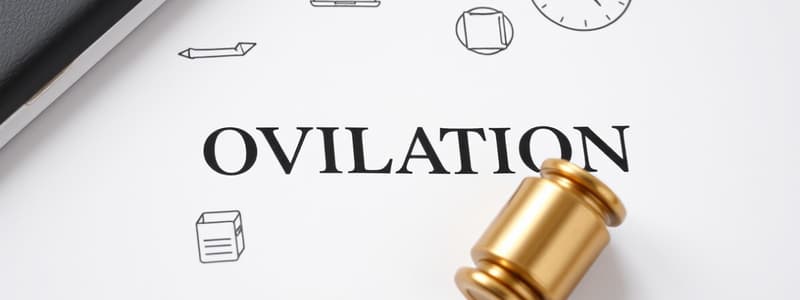Podcast
Questions and Answers
What is the definition of obligation as stated in Article 1156 of the New Civil Code?
What is the definition of obligation as stated in Article 1156 of the New Civil Code?
- A juridical necessity to give, to do or not to do. (correct)
- A financial requirement to pay debts.
- A moral necessity to help others.
- A social guideline for personal relationships.
Which of the following is NOT one of the essential requisites of an obligation?
Which of the following is NOT one of the essential requisites of an obligation?
- Causal relationship (correct)
- Object/prestation
- Active subject
- Juridical or legal tie
In obligations arising from contracts, what is the usual requirement for their validity?
In obligations arising from contracts, what is the usual requirement for their validity?
- They require a notarized signature.
- The law does not require any specific form. (correct)
- They must be verbally agreed upon.
- They must always be documented in writing.
What is a personal obligation that requires an act to be performed?
What is a personal obligation that requires an act to be performed?
Which of the following sources does NOT contribute to obligations?
Which of the following sources does NOT contribute to obligations?
What is classified as a real obligation?
What is classified as a real obligation?
What do we call the party entitled to demand the fulfillment of an obligation?
What do we call the party entitled to demand the fulfillment of an obligation?
Which of the following is an example of a negative personal obligation?
Which of the following is an example of a negative personal obligation?
What is a fortuitous event in the context of obligations?
What is a fortuitous event in the context of obligations?
Which type of obligation is characterized by immediate demandability?
Which type of obligation is characterized by immediate demandability?
What occurs when an impossible condition is placed on an obligation?
What occurs when an impossible condition is placed on an obligation?
What happens to a conditional obligation if the condition is solely within the control of the debtor?
What happens to a conditional obligation if the condition is solely within the control of the debtor?
If an object deteriorates without the fault of the debtor, who bears the impairment?
If an object deteriorates without the fault of the debtor, who bears the impairment?
Which condition is void due to it being dependent on the will of a third person?
Which condition is void due to it being dependent on the will of a third person?
What is the outcome if a debtor prevents the fulfillment of a condition?
What is the outcome if a debtor prevents the fulfillment of a condition?
What governs an obligation that is dependent on a specific time period?
What governs an obligation that is dependent on a specific time period?
What choice does a creditor have if a thing deteriorates due to the fault of the debtor?
What choice does a creditor have if a thing deteriorates due to the fault of the debtor?
In which case is the obligation extinguished?
In which case is the obligation extinguished?
Flashcards are hidden until you start studying
Study Notes
Meaning of Obligation
- Obligation originates from the Latin term "obligatio," meaning tying or binding.
- Defined as a juridical necessity to give, do, or refrain from doing something.
- In case of noncompliance, courts can enforce fulfillment or provide economic compensation.
Essential Requisites of an Obligation
- A juridical tie connects the parties to the obligation (efficient cause).
- The active subject (creditor/obligee) has the right to demand fulfillment.
- The passive subject (debtor/obligor) has the duty to fulfill the obligation.
- The object/prestation is the specific conduct required from the debtor.
Form of Obligations
- Generally, no specific form is required for obligations arising from contracts for validity.
- Obligations can be oral, written, or a combination of both.
Kinds of Obligation According to Subject Matter
- Real obligation involves the obligor delivering a tangible subject matter.
- Personal obligation requires actions to be done or avoided by the obligor.
Types of Personal Obligations
- Positive personal obligation refers to actions to be performed.
- Negative personal obligation involves refraining from certain actions, including not giving.
Sources of Obligations
- Arise from law, contracts, quasi-contracts, crimes or punishable acts, and quasi-delicts or torts.
Nature and Effect of Obligations
- Those guilty of fraud, negligence, or delay are liable for damages under Article 1170.
- A fortuitous event, unforeseen or inevitable, absolves the debtor from liability for non-performance.
Kinds of Obligations
- Pure obligation: Immediate and demandable, not conditioned or tied to specific dates.
- Conditional obligation: Effectivity depends on the fulfillment of a specified condition.
Types of Conditions
- Suspensive condition: Fulfillment creates a new obligation.
- Resolutory condition: Fulfillment extinguishes an existing obligation.
Potestative Condition
- If fulfillment depends solely on the debtor's will, the obligation is void.
Casual Condition
- If the condition depends on chance or a third party's will, the obligation remains valid.
Impossible Conditions
- Conditions that are illegal or against public policy annul the obligation, yet the valid part remains enforceable.
Rules During Pendency of Suspensive Condition
- Loss of the subject without the debtor's fault extinguishes the obligation.
- Loss through the debtor's fault necessitates repayment of damages.
- Deterioration without fault impacts the creditor; if with fault, the creditor may rescind or fulfill with damages.
- Improvements benefit the creditor unless made at the debtor's expense, which may limit rights.
Obligation with a Period
- Obligations may depend on a specific time period for effects to take place.
Studying That Suits You
Use AI to generate personalized quizzes and flashcards to suit your learning preferences.




